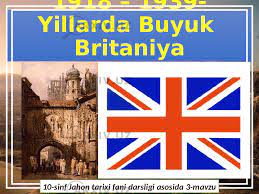SHARE WITH FRIENDS:
Great Britain in 1918-1939.
PLAN.
-
Consequences of the First World War for Great Britain.
-
Changes in the country's economic and political life.
-
A second Labor government.
-
Foreign policy in 1924-1939.
The consequences of the First World War for Great Britain are determined, first of all, by the fact that it was one of the countries that won this war.
Great Britain's military power and influence on the international arena grew even more, and it became a country with a dominant position in the League of Nations.
Great Britain won the right to rule Palestine, Transjordan and Iraq in the Middle East. In Africa, Tanganyika, Togo and a part of Cameroon also had such right of Great Britain.
The war greatly damaged its position in the world and reduced its dominance in the world market. Financial leadership has also ended. As a result, it turned from a lender to a borrower. For example, the internal state debt of Great Britain in 1914 is 650 mln. 8 billion from pounds. reached the pound. 5 billion from the USA. remained in debt in the amount of more than USD.
In the fall of 1920, the economic crisis began, covering all sectors of the country's economy. In 1921, industrial production fell by a third to 68 percent of its pre-war level. Coal production decreased by 30 percent, and the volume of foreign trade decreased by 2 times from the pre-war level.
1924-1929 was a period of partial stabilization in the economy of the countries. However, the UK economy remained virtually stagnant.
During this period, the life of the country was marked by the struggle between three parties - Liberals, Conservatives and Labor parties.
In 1918, Lloyd-George again took the post of prime minister and led the government until 1922. During this period, the coalition government suffered both domestic and foreign policy failures.
In 1921, the Great Britain-Ireland Treaty was signed. According to him, Ireland was divided into two. Dominion rights were granted to southern Ireland, with Dublin as its capital. Northern Ireland remained part of Great Britain. From that time, the country was officially called the "United Kingdom of Great Britain and Northern Ireland".
Great Britain's aggression against Turkey together with Greece was defeated. Patriotic forces under the leadership of Kamal Ota Turk preserved the independence of Turkey.
For the first time in the history of Great Britain, the Labor Party was entrusted with the formation of a government. In January 1924, a new government was formed under the leadership of R. Macdonald (1886-1937), the leader of this party. R. Macdonald's government did not last long.
-
Even during Baldwin's prime ministership (1924-1929), there were no significant changes in the British economy.
Mine owners announced a reduction in wages on May 1926, 1. In response to this, on May 4, a general strike of workers began in Great Britain. It has a total of 6 million. worker attended. The trade unions wanted the general strike to be based on purely economic demands. However, there was a danger that the strikes would go beyond the economic sphere and turn into a political conflict.
The general strike of 1926 was defeated.
In May 1929, the next parliamentary election was held in Great Britain. Labor won it, albeit by a narrow margin.
At the beginning of 1930, an economic crisis began in Great Britain, and it reached its peak in 1932. In this year, industrial production decreased by 1929% compared to 20. The number of unemployed is 3-3,5 million. established a person.
In October 1931, extraordinary parliamentary elections were held. The conservative party won it (740 seats). Another national government was established (1931-1935). It was again directed by R. Macdonald. The government began to implement a program to get out of the crisis by reducing wages and spending on social sectors. At the moment, US and French banks have lent 80 million to Great Britain. lent a sum of pounds sterling.
The measures taken by the government have borne fruit. Starting from the end of 1932, the economy began to recover somewhat. By 1934, the volume of industrial production reached the level of 1929.
By the end of the 30s, Great Britain's economic position in the world decreased significantly. Now, not only the USA, but also Germany, Italy and Japan became his rivals.
Great Britain was one of the initiators of the Locarno Conference held in 1925. This conference did not create a system of guarantees for Germany, which would hinder the free movement of Germany in Eastern Europe.
N. Chamberlain (1937-1869), the leader of the Conservative Party who came to power in 1940, during his 3-year tenure as Prime Minister, took the field as the initiator of the policy of "pacifying" Hitler.
Information about Germany's plan to start a war against the Western countries, not the Soviet state, soon became known to Great Britain. Now Great Britain began to forcefully prepare for war. Military spending was doubled.
On April 1939, 15, Great Britain introduced conscription for the first time in peacetime.
Review questions.
-
What were the consequences of World War I for Great Britain?
-
What were the consequences of the global economic crisis for Britain?
-
What is the essence of Chamberlain's policy of appeasement of Germany?
-
When did Great Britain recognize the USSR?
